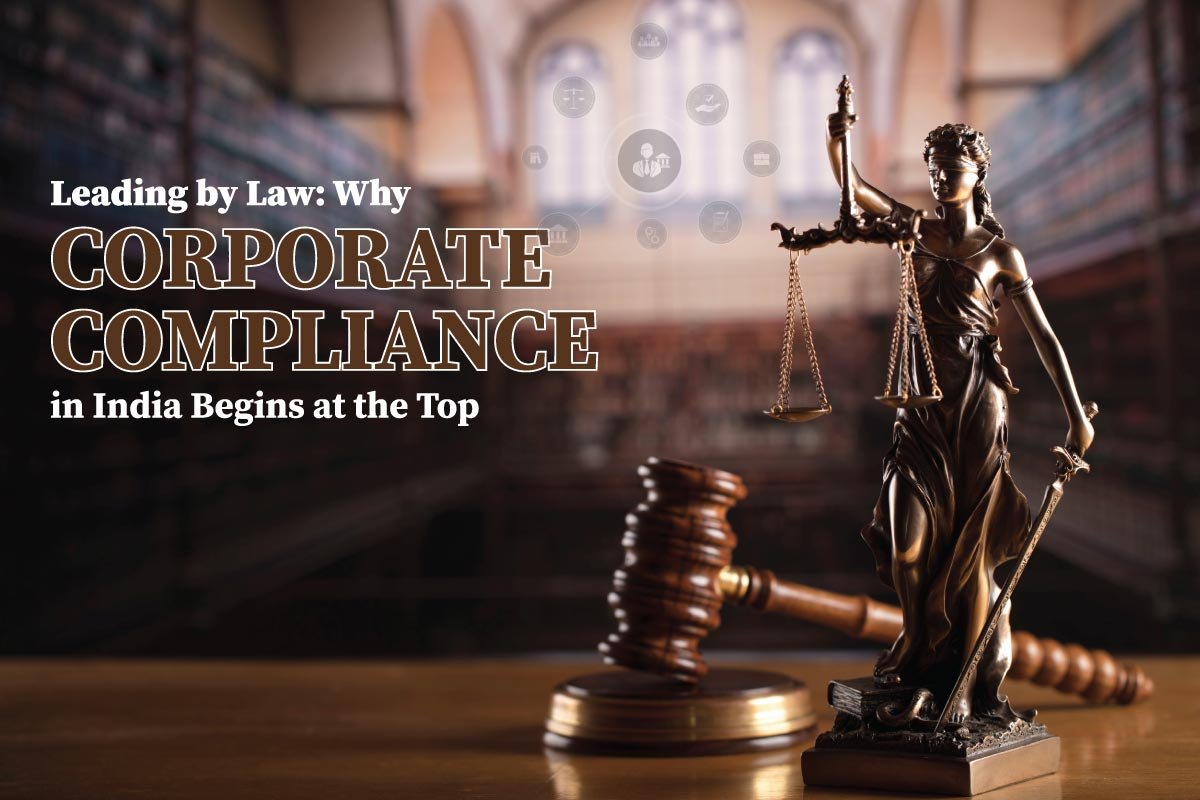When corporate governance fails, the consequences can be severe, not only for companies but also for their employees, investors, and the broader economy. India has witnessed this firsthand in major scandals like the Satyam Computers fraud and the IL&FS financial crisis, where poor oversight and weak legal compliance led to billions in losses and shaken public trust. These events remind us of a simple truth: good governance must begin at the top.
Laws like the Companies Act, 2013, and SEBI’s regulations were created to guide businesses toward ethical, transparent practices. But laws alone aren’t enough. Business leaders and board members play a vital role in setting the tone for legal and ethical conduct. This article explores how legal compliance in India is shaped not only by regulations but by the people responsible for enforcing them, and why leadership must take the lead in building a culture of accountability.
When Governance Fails, or Prevails: Case Studies
Corporate governance exists to make sure companies are run honestly, fairly, and responsibly. It sets rules for leaders to protect everyone’s interests, like employees, investors, and customers. When it fails, companies can face fraud, loss of trust, and big financial problems, which can hurt people and the economy.

- Satyam Computers Scandal (2009): The 2009 Satyam scam involved fake earnings and misuse of company funds by founder Ramalinga Raju, leading to a ₹7,800 crore loss. It revealed weak corporate governance and auditing. In response, the government used the Companies Act 2013 to strengthen rules on audits, transparency, and independent directors.
- IL&FS Crisis (2018): The IL&FS crisis began when the company failed to repay over ₹91,000 crore due to poor management and hidden debts. It caused panic in financial markets and revealed major corporate governance failures. The government acted under the Companies Act 2013, replaced the board, and took legal action against auditors to restore trust.
- Infosys (Positive Example): Infosys is known for excellent corporate governance, with strong ethics and transparency. It was among the first to publish a voluntary compliance report. With mostly independent directors, Infosys ensures fair decisions. Its practices follow the Companies Act 2013, building trust, legal compliance, and confidence among investors and stakeholders.
These incidents damaged public trust and led to major financial losses. At the core was weak board accountability and poor compliance, showing how leadership failures can harm entire industries. To prevent such problems, the government has introduced strong laws and rules, explained in the next section.
Prevention Through Good Corporate Governance
Good corporate governance helps prevent fraud, mismanagement, and business failure by setting clear rules and responsibilities. It ensures companies act ethically, follow the law, and protect the interests of everyone involved, from employees to investors.
Regulatory Landscape in India:
1) The Companies Act, 2013 says every company must have a fair board with some independent directors. It also requires special groups like Audit, Nomination, and CSR committees. Companies must share important information openly and spend at least 2% of their profits on helping society through Corporate Social Responsibility (CSR).
- Section 134: Directors must confirm that financial reports are truthful.
- Section 135: Companies meeting certain criteria must spend at least 2% of profits on CSR.
- Section 177: Requires forming an Audit Committee for internal control.
- Section 447: Defines punishment for fraud.
2) SEBI’s 2015 rules apply to companies listed on the stock market. They must have independent directors, share financial reports every quarter, and quickly inform the public about major events. These rules help keep companies honest and build trust with investors by ensuring transparency.

- Regulation 17: Requires a balanced and independent Board of Directors.
- Regulation 18: Sets rules for Audit Committees.
- Regulation 30: Companies must report important events to the stock exchange.
3) The Prevention of Corruption Act, 1988, as amended in 2018, bans both public servants accepting bribes and businesses offering them. Companies or senior leaders can be punished with fines and 3–7 years in prison, unless they can prove they had strong anti-bribery measures in place.
Key Rules:
- Section 7: Public servants are banned from accepting any kind of bribe, money, gifts, or favors, in exchange for doing (or not doing) official work.
- Sections 8 & 9: Any person or company that gives or promises a bribe to a public official is also committing a crime.
- Section 10: If a company is involved in giving bribes, its senior managers or directors can be punished unless they can prove they had strong anti-bribery policies in place.
- Punishment: Includes fines and imprisonment for 3 to 7 years.
4) The Insolvency and Bankruptcy Code, 2016, unifies India’s old insolvency laws into one single system. It streamlines resolution within 180 days, empowers creditors to initiate the process, and suspends directors’ control. The NCLT oversees proceedings, helping revive businesses or recover debts efficiently and fairly.
Key Rules:
- Section 7: Creditors can apply for insolvency proceedings.
- Section 12: The process must be completed within 180 days (extendable to 330 days).
- Section 29A: Restricts fraudulent promoters from buying back their company during insolvency.
5) Indian law now mandates a whistleblower (vigil) mechanism under Section 177 of the Companies Act 2013. This allows employees and others to safely report fraud or wrongdoing in a company. Protected reporting, alongside clear internal policies and audit committees, helps catch problems early and builds trust.
- Section 177(9) of Companies Act: Listed companies must have a whistleblower mechanism.
- SEBI LODR Regulation 22: Companies must allow employees to report unethical behavior anonymously.
6) The Prevention of Money Laundering Act, 2002 (PMLA) helps stop dirty money from being made to look clean. Banks and businesses must keep records, verify identities, and report suspicious transactions to FIU-IND. The law empowers authorities to seize and confiscate assets linked to crime and prosecute offenders, including lengthy jail terms and fines.
Key Rules:
- Section 12: Banks, financial institutions, and businesses must maintain records, verify customer identities (KYC), and report suspicious transactions to the Financial Intelligence Unit–India (FIU-IND).
- Section 5: Authorities can attach (freeze) any property or assets suspected of being linked to money laundering.
- Section 8: After investigation, courts can confiscate the attached properties permanently if found guilty.
- Section 4: Offenders can face rigorous imprisonment of 3 to 7 years, extendable to 10 years in drug-related cases, along with heavy fines.
7) The Indian e‑Procurement system makes public tendering fully online. It ensures fair and transparent purchasing through methods like open bidding, reverse auction, and single-source procurement. All tender documents, bidder lists, and results are published on the procurement portal to maintain fairness and accountability.

- Online Tendering: Public procurement is fully conducted through an online platform to reduce manual intervention and corruption.
- Open Bidding: All eligible suppliers can participate, ensuring competition and transparency.
- Reverse Auction: Vendors bid by lowering prices, helping the government get the best value.
- Single-Source Procurement: Used only when necessary, with documented justification to avoid misuse.
- Public Disclosure: Tender documents, lists of participating bidders, and final results are made publicly available on the portal for full transparency and accountability.
Business Fraud Laws in India
| Laws | What It Deals with | Why It Matters? |
| Companies Act, 2013 | Corporate honesty | Makes directors accountable for truth in company reports |
| SEBI LODR, 2015 | Transparency | Ensures listed companies share accurate and timely info |
| Prevention of Corruption Act, 1988 | Bribery | Stops companies from giving or taking bribes |
| IBC, 2016 | Business failure | Legal process for fair resolution if business goes broke |
| Whistleblower Rules | Reporting fraud | Protects employees who speak out against fraud |
| PMLA, 2002 | Dirty money | Catches businesses laundering illegal money |
| IT Act, 2000 | Cyber fraud | Prevents digital theft, hacking, and online scams |
How Different Sectors in India Are Governed: Laws, Scandals, and Government Response?

Different industries in India face unique challenges, and the government has introduced specific laws and actions to tackle fraud and ensure transparency. This table highlights key sectors, related regulations, and how authorities responded to major corporate issues.
| Sector | Relevant Law/Regulation | Reason/Scandal | Government Action Taken |
| IT & Tech | Companies Act, 2013 SEBI LODR Regulations | Satyam Scandal (2009), Faked financial statements | Strengthened audit rules, made board disclosures and CSR reporting mandatory. |
| Banking & Finance | RBI GuidelinesPrevention of Corruption Act, IBC 2016 | Yes Bank Crisis, PMC Bank Scam | RBI took control of boards, merged weaker banks, and implemented stricter monitoring. |
| Infrastructure | Companies Act, 2013, IBC, 2016 | IL&FS Default (₹90,000 Cr) | The government replaced management, referred the company to NCLT, and tightened debt reporting rules. |
| Real Estate | RERA Act, 2016Companies Act, 2013 | Multiple project delays and fraud by builders | Introduced RERA for project registration and transparency; regulated builder-buyer agreements |
| Pharmaceuticals | Drugs & Cosmetics Companies Act, 2013 | Poor manufacturing practices, fake drug approvals | Introduced regular inspections, digitized the drug approval process, and imposed stricter penalties |
| Telecom | TRAI Regulations Companies Act, 2013 | AGR Dues Case Companies under-reported earnings | Supreme Court ruling enforced payment; the government revised revenue-sharing models |
| Startups/Fintech | DPDP BillIT Act, 2000 SEBI Sandbox Framework | Data misuse, investor fraud in new-age firms | Introduced data protection bill, investor education campaigns, and regulatory sandboxes |
| Education/EdTech | Consumer Protection Act IT Rules, 2021 | Misleading advertisements, student data misuse | Issued strict advertising guidelines; rules for safe data handling in education platforms |
Conclusion
Strong corporate governance isn’t just about following rules; it’s about leading with honesty and responsibility. India’s laws, like the Companies Act and SEBI rules, guide businesses to be fair, transparent, and accountable. But the real difference is made when leaders follow these rules in spirit, not just in writing. With clear laws and strong leadership, businesses can protect investors, support the economy, and build trust. In short, legal compliance begins and succeeds at the top.











